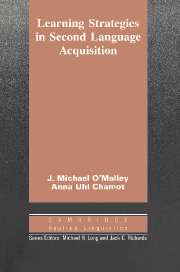Book contents
- Frontmatter
- Contents
- Series editors' preface
- Preface
- 1 Introduction
- 2 A cognitive theory of learning
- 3 How cognitive theory applies to second language acquisition
- 4 Learning strategies: methods and research
- 5 Strategies used by second language learners
- 6 Instruction in learning strategies
- 7 Learning strategies: models and materials
- 8 Summary and conclusions
- Glossary
- References
- Author index
- Subject index
4 - Learning strategies: methods and research
Published online by Cambridge University Press: 05 October 2012
- Frontmatter
- Contents
- Series editors' preface
- Preface
- 1 Introduction
- 2 A cognitive theory of learning
- 3 How cognitive theory applies to second language acquisition
- 4 Learning strategies: methods and research
- 5 Strategies used by second language learners
- 6 Instruction in learning strategies
- 7 Learning strategies: models and materials
- 8 Summary and conclusions
- Glossary
- References
- Author index
- Subject index
Summary
In previous chapters we established the foundation for describing second language acquisition and learning strategies as complex cognitive skills within a cognitive-theoretical framework. This theoretical foundation is necessary for the research on learning strategies in second language acquisition we present in this and later chapters to have substance and meaning in a broader framework than would be provided by simply demonstrating that students report using learning strategies or that the strategies can be taught. We use the theory in this chapter to build a rationale for analyzing findings from the descriptive research, and in later chapters we use it to specify the conditions under which strategy training is likely to be effective.
Research on learning strategies is based on the assertion that strategies begin as declarative knowledge that can become proceduralized with practice and, like complex cognitive skills, proceed through the cognitive, associative, and autonomous stages of learning. At the cognitive stage, the strategy application is still based on declarative knowledge, requires processing in short-term memory, and is not performed automatically. The student may have a firm recollection of using the strategy with a specific task. In this case, research on how the strategy is used should be relatively easy and presumably could be performed through virtually any form of data collection, such as interviews or questionnaires. However, if the strategy application has become proceduralized and the strategy use is performed automatically, the student may not be aware of using the strategy, and data collection might require specialized techniques that interrupt ongoing mental processes.
- Type
- Chapter
- Information
- Learning Strategies in Second Language Acquisition , pp. 85 - 113Publisher: Cambridge University PressPrint publication year: 1990
- 1
- Cited by



